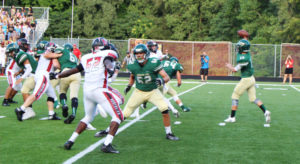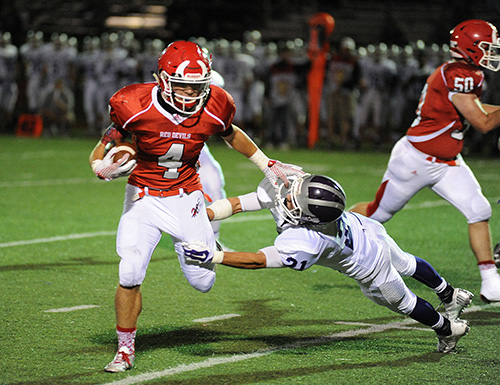Fixing your football team
During my 23 years coaching football, I’ve had the chance to turn around two losing programs. Both had several commonalities that contributed to their lack of success. Here are 15 of them that all football programs should avoid.
 1. Too many offensive plays.
1. Too many offensive plays.
Winning football is about execution, not tricking the other team. You want to confuse your opponent, not your own team. Sometimes, I see a “flavor of the week” offense, where coaches try to put in the best plays they saw in college or pro football over the last week. I remember coaching against one team that had nearly 30 formations and ran two plays from each. It was easy to tell what play they were going to run. They even complained to the athletic director that we were calling out their plays before they ran them.
Settle on a few plays and learn the adjustments so you can execute them in any situation. Every coach has lost to a team whose offense fits on a note card. You only need one well-executed play if opponents can’t stop it.2. Playing too many defenses.
It’s amazing how many teams use a multiple-front defense. Now, players must make sure they line up correctly and worry about their changing assignments and keys. Even professional teams run either a three- or four-man front.
Choose a defense that fits your team’s style and master it. You can add blitzes and stunts once everyone has learned their assignments and techniques.
3. Players missing practices.
Every unsuccessful program I worked with had players who didn’t show up for practice. This shows that other things are more important to them. I hear coaches say, “Well, he’s my best player, and if he doesn’t play we have no chance to win.” If that’s his level of commitment, you have no chance to win anyway.
Have an attendance policy for practices. Here is what some coaches have done:
- If you miss practice, you don’t play that week.
- Each day of practice missed equals a quarter on the bench.
- Missing practice means not starting, and if your backup is doing a good job, you stay on the bench.
I’ve seen coaches allow one miss for every 10 summer workouts attended. Some schedule an evening or early-morning practice one day a week to allow parents to take care of things like doctor appointments.
I recommend that coaching staffs make clear what constitutes excused and unexcused absence if you are going to differentiate between them. The issue I encountered was that too many parents were making up excuses or lying for their son, so I stopped differentiating between them.
Head coaches can choose to give your position coaches authority to excuse authorized absences, or you can authorize all pre-excused absences yourself. Ultimately, the buck stops with you.
4. Lack of practice organization.
Losing programs often don’t have a practice schedule or do not follow it. Coaches don’t know how much time they have to practice certain drills, players pace themselves and don’t work hard, and parents don’t know when to pick up their child.
Have a detailed practice plan and follow it. With cell phones and timers, it’s easy to put the whole practice plan in your phone and have a buzzer sound when each period is up. Coaches know how much time they have for each drill, and if you post the practice plan, players know how much time they have and give more effort to get more reps. I also suggest posting the practice plan online so each position coach can add detail to their particular position. If you don’t have enough time to accomplish your goals, you might need to simplify your offense or defense.
5. Assessed undisciplined penalties.
I see teams beat themselves by repeatedly jumping offsides, illegal procedures, delays of game and other penalties. A single late-hit penalty can be excused as an accident, but repeat infractions shows a lack of self-control.
Practice your defense and blitzes going on the ball — not on sound. Quickly get your plays in to the offense, and call penalties in practice so your players learn about the consequences.
6. Lack competitiveness.
Every time these players face competition, they make an excuse, whine or develop an injury commonly known as the “loser’s limp.”
Develop a competitive environment in practices. Give the winner a reward, and the losers a punishment. They learn that everything is a competition and they need to learn how to compete, win and lose — all three with class.
7. Part-time coaches.
If the coaches aren’t there, you can’t expect the players to be there. Coaching is not about talking a good game on Fridays; it’s about properly teaching players Monday through Thursday.
I’d rather have one good assistant who’s present all the time than five bad ones who are part-time. I understand a family emergency, but there’s a work-life balance. Coaches are role models, and being prepared is essential.
8. Coaches not in the school.
I realize this is fairly dependent on where you live, and there are many great coaches who are not teachers. But in my experience, if the coach and most of his assistants are not in the building, it’s a challenge understanding the relationship between the school and the program.

Don’t take a head coaching position if you’re in the building, unless administration assures you that they will hire assistants who are teachers.
9. Wasting time on administrative tasks.
No one needs to sit for five hours watching a coach enter data on a computer. And the offensive and defensive coaches don’t need to watch each other design their game plans.
Be organized. As a head coach, you likely hired competent coaches you trust. Give each coach responsibilities and hold them accountable, as you hold your players accountable to their assignments. Once they are done, let them go home.
10. Failing to field the best players.
Every coach has had the player that looks like Tarzan and plays like Jane. If a player is getting his butt kicked all week in practice, he won’t somehow start playing well on Friday.
Play results, not potential. If the 160-pound weakling is playing at a higher level than your 220-pound stud, then play him.
11. Unorganized special teams.
Poor performing teams don’t have a set scheme and often only practice special teams on Thursday. The players don’t want to be on special teams, and they don’t understand why these teams are important to winning.
Set aside practice time for special teams just like every other part of the game. Teach the players why they are important. Put your best players on specials. Try to win games with special teams, and not treat them as an afterthought.
12. No parent support.
Losing programs tend to lack parent involvement, and the parents are not supportive of the football program.
Find ways for the parents to get involved — team meals, moms and dads wearing jerseys. Offer a class for parents to teach them football. Show them how to be supportive. Plenty of parents want to be supportive, but they may not know how to help. Let them know your needs.
13. Lack of emotional control.
We sometimes see players respond to a taunt or shove by throwing a punch. Or they let opponents take them out of their game with taunts. Some coaches try to “stick it” to other teams by running up the scoreboard, or they lose their cool with referees.
Use a distraction drill to teach your players to focus. Teach them the correct way to respond when the other team does something stupid. Show them the consequence of what happens with bad choices, and teach them that their goals and the team goals are more important. Then, practice and model it yourself as a coach.
14. Focusing too much on the other team.
Losing teams game plan to the other team’s weakness and not their own strengths. They worry about what the other team will do and not about their own team’s execution. They often put in a new offense or defense that week because they believe it’s the secret to winning.
I’m OK with a small tweak, but I ‘ve never seen anything more than small adjustments win a game.
15. Poor scout team.
There are many reasons for this: poorly drawn scout cards, lack of a practice script, playing the worst players on the scout team.
Put players on the scout team who will give a good look. Reward scout team players so they feel valued and understand how they help the team win. Have clear scout cards, and have the players watch film. Have a script so you know what’s coming when you’re practicing plays. Focus on stopping their top three to five runs and passes. If they can beat you left handed, they were probably going to beat you anyways.
I’ve always found that coaches need to stop beating themselves before they can be successful against another team. I’m not promising that you will win every game with these suggestions, but it’s my hope that you will see these problems all fall into common areas: being organized, using time efficiently and being disciplined in all phases of coaching. The biggest hurdle to implementing these changes is taking the time to do it.
Jerome Learman has coached football for 23 years. He currently coaches and teaches physical education at Osan American High School at the Osan Air Force Base in South Korea.





